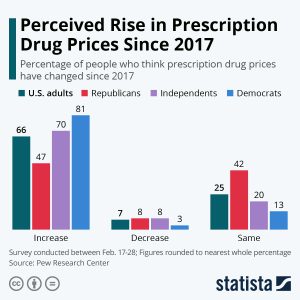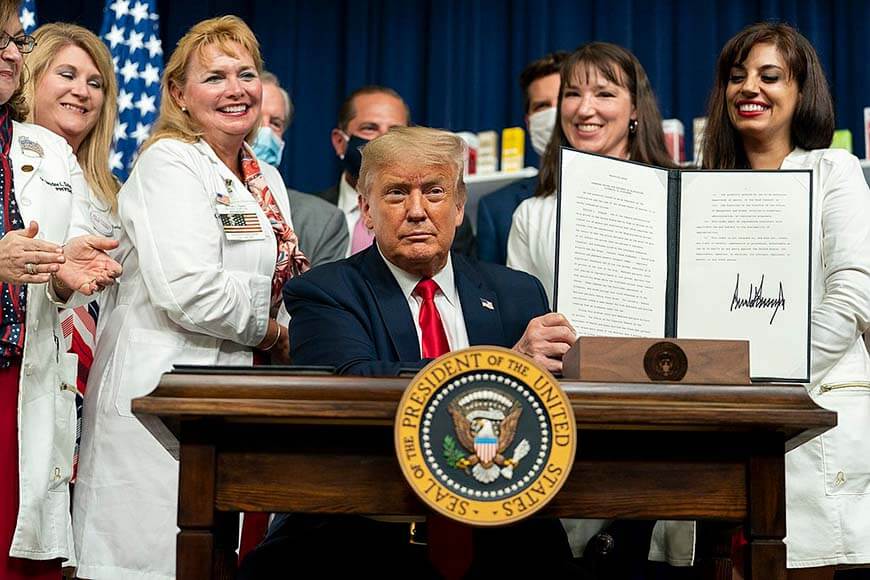Like few others in living memory, 2020 has been a year defined by thinking about health, access to quality healthcare, and the importance of those working in the greater medical industry.
For countries all around the world, the Covid-19 pandemic has revealed the strengths and flaws of healthcare systems, and effective state messaging on public health. Few have managed well. Most have struggled.
The reality is it’s a lie that we don’t need health care and it’s a lie especially in the time of Covid.
With more than nine million infected, over 228,000 Americans have died since the pandemic began. With positive rates across most states soaring (a million in the last two weeks), the third Covid-19 wave has already begun. The winter is likely to be the pandemic’s worst period in America, yet.
Regardless of location, race, occupation, or age, Covid-19 has come to dominate most ways Americans interact with each other—and consider the role healthcare plays in their lives.
Whether President Donald Trump or former Vice-President Joseph Biden, Jr. occupy the Oval Office next year could determine a great deal about it in the U.S, over the coming decade.
“Covid has made us all healthcare voters,” David Mitchell, founder of a health advocacy group that refuses funding from pharmaceutical companies, told the Guardian recently.
From Obamacare to Bidencare
Biden’s policy plan for healthcare centers on the strengthening of the Affordable Care Act (ACA), the signature healthcare legislation of President Barack Obama.
Largely through the state-by-state expansion of Medicaid, ‘Obamacare’ has been able to provide care for more than 20 million Americans.
Despite deregulatory interference from the Trump administration, it has survived through the decade, and is currently enjoying its highest popularity with voters (55 percent) since its creation in 2010. Biden wants to pick up that ball, and run with it.
“The meat of it is ramping Obamacare up,” Sarah Kliff, a New York Times health reporter, said on The Ezra Klein Show podcast this week, “and creating the more liberal version of Obamacare that was floated but wasn’t passed during the healthcare debate in 2010.”

‘Bidencare’ would essentially be ‘Obamacare Plus.’ The public option for health insurance would become available for free in states that are yet to expand Medicaid, which could see around five million gain coverage.
Currently, the ACA offers tax credits if you spend no more than 10 percent of your income on health insurance. Biden wants to lower that to 8.5 percent.
‘Obamacare’ offers three tiers of health insurance that represent between 60 and 90 percent of total healthcare costs. Though subsidies, most ACA users gain ‘silver’ coverage plans, covering 70 percent of health.
Biden proposes to increase subsidies to cover around 80 percent, meaning ‘gold’ plans would be accessible to most. Most private health insurers cover upwards of 80 percent of total costs.
“It could be the difference between a $3000 deductible or a $1000 deductible, or [getting] a lower deductible at the exact same premium,” Kliff, one of the leading American health journalists, says.
I think we should focus on what this is going to mean for health care, what it’s going to mean to once again have to say if you’re pregnant it’s pre-existing conditions, to be able to charge women more for the same procedure as men.
A ban on surprise billing, in part prompted by reporting by Kliff, will be likely enforced. Future issues like the implementation of the Cures Act Final Rule—a hugely consequential piece of legislation on medical data and information sharing which recently had some final compliance deadlines extended—should become interesting to watch.
Despite primary challenges promoting more nationalized healthcare policies, Biden’s plans have broad support within his own party. A Senate flip, and an enhanced majority in the House, could see Democrats with plenty of running board to pass legislation, too.
“I think we should focus on what this is going to mean for health care, what it’s going to mean to once again have to say if you’re pregnant it’s pre-existing conditions, to be able to charge women more for the same procedure as men,” Biden told the media last week.
Even if the Democrats have full control of Washington, Kliff is not optimistic sweeping ACA reform is a slam dunk.
“The healthcare lobbies are so strong that it’s been like 18 months, despite the White House saying we should do [reform on surprise billing], partisan legislation is just completely stuck and probably not going anywhere,” she says.
Trump’s plans, lack of plans, and pandemic failure
Trump’s opposition to Obamacare was one aspect of his ascension to the White House in 2016. Republicans have opposed the ACA ever since it was made into law, and helped lead them to a midterms victory two years later.
Since Senator John McCain’s famed ‘thumbs down’ on ACA repeal in 2017, removal of Obamacare writ-large has evaded the Republicans in DC. It has not been from lack of trying, though.
According to the Brookings Institute, a liberal think tank, Republicans have weakened both the awareness and effectiveness of the ACA.
Subsidies encouraging health insurers to join policy exchanges have been removed, while multiple “off ramps” for cheaper, private, lower quality insurance plans have sprung up.
Along with weakening its regulatory structure, enrollment windows has halved, while general publicity has nosedived.
The irony of the administration’s actions lie in many Republican-led states, however. Apart from the South, Medicaid expansion has flourished in conservative-leaning regions.
Five states—Virginia, Maine, Idaho, Utah and Nebraska—have expanded Medicaid since Trump was elected, while Missouri and Oklahoma will join them next year. Only Virginia and Maine are currently governed by Democrats.

While long promoting a “beautiful” healthcare plan that would replace the ACA, Trump has revealed almost nothing about its specifics, days out from the election; though he has gone as far as suggesting that American doctors are get paid more if a patient dies from Covid-19. In the meanwhile, Trump has allowed other aspects of American healthcare slip.
Despite prior promises from the President, drug prices have not dropped during the last four years, with both Republican and Democratic voters noticing it. Action on surprise billing—an issue with strong bipartisan support—has virtually stalled.
On the medical education side, the Trump administration suggested a policy change in July that would have seen tens of thousands of international students studying at U.S., including med students, sent back to their home countries if upcoming courses went fully online.
After considerable pushback from states, universities, and technology companies, Trump abandoned the plan.
“International medical students can now focus on their studies, rather than their immigration status, as they prepare to enter the health field and help fight this pandemic,” Dr. Susan R. Bailey, President of the American Medical Association, said.
Despite the absence of a larger plan, Kliff says there has been some Republican talk about healthcare recently. Republican Senators Lamar Alexander and Bill Cassidy have been vocal about addressing surprise billing, while some minor legislation has been done around drug prices.
International medical students can now focus on their studies, rather than their immigration status, as they prepare to enter the health field and help fight this pandemic.
“[But] in terms of really getting at the issues of covering Americans and expanding access to healthcare, I don’t think I see much of that,” Kliff says.
“I think after going through the 2017 effort and throwing out like eight different plans, none of them able to unify the caucasus, they have really turned their attention away from [healthcare].”
Beyond all else, the Trump administration’s poor response to Covid-19 looks like to be his enduring mark on American health.
Often undermined by Trump’s own damaging, confused messaging, his administration’s overall response has been shockingly flat-footed (the U.S. supplies a fifth of the world’s total Covid-19 positives cases).
Personal protective equipment (PPE) distribution to medical workers has been surprisingly poor, while rural communities across America—many of whom will vote overwhelmingly for Trump next week—are suffering worse from the pandemic, due to a lack of resources.
Recent numbers have shown primary care physician numbers decreasing, with a shortage of more than 50,000 possible by 2033.
The president has found success with Operation Warp Speed, however.
With more than $10 billion pouring into efforts, scientific progress on an effective coronavirus vaccine has moved at an incredible pace.
Next June, officials hope it will be available to Americans. Trump has since said Medicaid and Medicare will cover the vaccine for millions of low-income Americans.
A gathering storm
Despite the pressure on hospitals, medical infrastructure, staff, and shocking case numbers, the American healthcare system has weathered the Covid-19 pandemic better than Kliff expected.
“It’s hard to know now, [because] we’re in the middle of this, but I don’t know that it’s quite as dramatic of a change to the healthcare system as I might have said … a few months ago,” she says.
A gathering storm may see that change.

On November 10, the Supreme Court will hear the first oral arguments on California v. Texas. Led by Texas, the case is being pursued by a group of 20 conservative states, wishing to strike down the ACA.
Their argument essentially boils down to the ACA’s individual mandate, and their changing perspective on it following the 2017 Republican tax bill. In passing the legislation, the penalty for not having health insurance dropped from around $700 to $0.
The theory is that this penalty was a tax, but if there is no longer a dollar figure, it becomes a mandate, which, they argue, would be unconstitutional.
They also claim that the mandate is so important to the entire ACA that if you remove it, you must also have to strike down the whole law.
Though many scholars believe its success is unlikely, the new seating of Amy Coney Barrett, a conservative Associate Justice, could potentially tip the scales. Just a week after the election, California v. Texas is among the first few cases she will hear on the Court.
Register where you stand on all these issues by casting your ballot. And remember, nobody would work this much to take something from you if it wasn’t valuable.
If it were to strike down the ACA, the ramifications would be wide-ranging. More than 20 million would lose healthcare, with around 10 million more likely losing it through a reduced Medicaid.
More than 130 million Americans with pre-existing conditions could face uncertainty about future insurance options, and healthcare. Expensive treatment could become more expensive. Even calorie count notices at fast food restaurants could be removed.
If that were to happen during a pandemic, at a time when Obamacare enjoys its highest ever support, and a replacement system is absent, it is hard to know how the health industry would react.
Voters in the U.S have shown that it’s on their minds, too. In North Carolina, a crucial swing state next week, expansion of Medicaid is on the ballot with Trump and Biden, helping juice already-high turnout.
“The reality is it’s a lie that we don’t need health care and it’s a lie especially in the time of Covid,” Rev. William J. Barber II, a prominent civil rights leader, recently told the New York Times, in Raleigh.
“Register where you stand on all these issues by casting your ballot. And remember, nobody would work this much to take something from you if it wasn’t valuable.”



